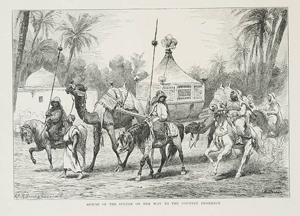
Source: Spouse of the Sultan on her way to the Country Residence (1878) - TIMEA.jpg, Dudubot, Wikimedia Commons
Good writers are considerate of you, the reader. They don’t want you to puzzle over the meaning of a word, get frustrated, or stop to use a dictionary. That’s why they include context clues for challenging words. These hints come in various forms, but all are designed to give you a sense of the unfamiliar word’s meaning.
Context clues come in many forms. Sometimes writers give you a synonym for an unknown word, as in “lazy” for “idle.” Other times, writers insert an antonym into the context. Recognizing a word’s opposite helps you infer its meaning, as in this sentence:
You hope that the arrogant camel may be more humble by the end of the tale.
You know that humble is a virtue so you guess that arrogant is a fault. Humble creatures are modest, so arrogant creatures must be proud, too proud to work for sure.
Writers also find that some words are challenging enough to warrant definitions in the context, as in this sentence:
Camels are herbivores, which mean they are plant eaters; their large, tough lips enable them to pick at thorny desert plants like the tamarisk.
Listing examples is another way writers give meaningful clues for words readers might not know. When tamarisks are included in a list of thorny vegetation such as sticks and prickles, you infer that they too are thorny.
Before you continue, listen to a song to review the types of context clues.

Source: Context Clues Song (Context Clues by Melissa), GrammarSongs by Melissa, YouTube
Now that you have a good idea about the kinds of context clues, see if you can figure out the meaning of the words highlighted in red as you read the story. The text highlighted in yellow should help you as you read. After you finish reading, identify the kind of context clue that is highlighted in yellow in the interactive exercise below.
Presently (1), meaning without undue delay or before long, the horse came to him on Monday morning, with a saddle on his back and a bit in his mouth, and said, “Camel, come out and trot like the rest of us.”
“Humph,” said the camel; and the horse went away and told the man.
Presently the dog came to him, with a stick in his mouth, and said, “Camel, come and fetch (2) and carry like the rest of us.”
“Humph,” said the camel; and the dog went away and told the man.
Presently the ox came to him, with the yoke on his neck and said, “Camel, come and plough like the rest of us.”
“Humph,” said the camel; and the ox went away and told the man.
At the end of the day the man called the horse and the dog and the ox together, and said, “Three, I’m very sorry for you; but that humph-thing in the desert can’t work, or he would have been here by now, so you must work double-time to make up for it.”
Once calm and contented, the animals were now irate (3) and they held a palaver, (4) and a council, and a pow-wow on the edge of the desert; and the camel came chewing on milkweed and laughed at them. Then he said, “Humph,” and went away again.
